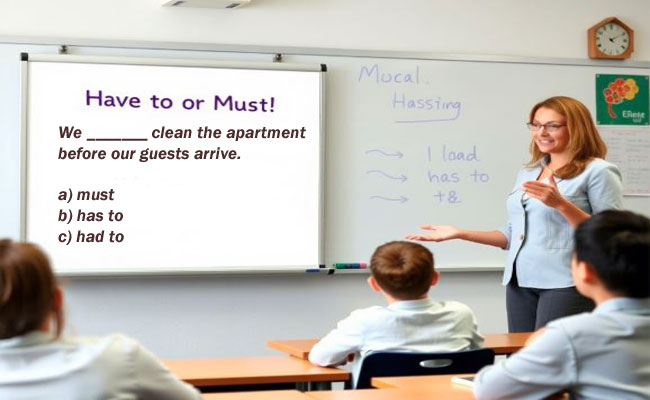Understanding “have to” and “must” is essential for mastering English modal verbs—both express obligation, but they are used slightly differently depending on tense, tone, or formality. Whether you’re a student, an ESL learner, or someone brushing up on grammar, this Have to or Must Quiz is perfect for you!
You can do this quiz online or print it out to test what you’ve learned on the “have to” and “must” English grammar page. Take the quiz below and check your answers at the bottom.
Have to or Must Quiz
Practice also more related quizzes: Verb Classification Quiz
What is a Verb? Quiz
What’s the Difference Between “Have to” and “Must”?
- Must is often used for personal obligations, rules, and formal instructions.
Example: You must wear a seatbelt. - ” Have to” is usually used for external obligations (laws, rules, or situations).
Example: I have to pay my taxes every year.
Have to or Must Quiz – Choose the Correct Answer
1. I _______ call my manager before 9 AM today.
a) must
b) had to
c) have to
2. Kids _______ eat too much sugar. It’s not healthy.
a) must
b) mustn’t
c) have to
3. We _______ clean the apartment before our guests arrive.
a) must
b) has to
c) had to
4. You _______ bring your passport when traveling internationally.
a) mustn’t
b) must
c) have
5. She _______ do the dishes last night because no one else was home.
a) had to
b) must
c) mustn’t
6. All passengers _______ wear seatbelts during takeoff.
a) must
b) have to
c) has to
7. He _______ leave the meeting early due to an emergency.
a) must
b) mustn’t
c) had to
8. Do you _______ work on national holidays?
a) have to
b) has to
c) must
9. We _______ be quiet in the library.
a) have to
b) must
c) mustn’t
10. They _______ stay outside because it was raining heavily.
a) must
b) had to
c) mustn’t
Quiz Answers about Have to and must
- c) have to
- b) mustn’t
- a) must
- b) must
- a) had to
- a) must
- c) had to
- a) have to
- b) must
- b) had to
Frequently Asked Questions (FAQs)
What is the difference between “must” and “have to”?
“Must” often expresses a personal or internal obligation, while “have to” indicates external rules or requirements.
Can “must” and “have to” be used interchangeably?
Yes, in many situations, but “must” is more formal and subjective, while “have to” is more objective.
Is “must” used in the past tense?
Not typically. The past form of “must” is “had to.”
What is the negative form of “must” and “have to”?
- Must → mustn’t (prohibition)
- Have to → don’t/doesn’t have to (lack of necessity)
When should I use “mustn’t”?
Use “mustn’t” to express something that is prohibited.
Example: You mustn’t smoke here.
Conclusion
This Have to / Must Quiz helps reinforce your understanding of modal verbs related to obligation and prohibition. Keep practicing to become more confident in using “have to” and “must” correctly in various tenses and contexts.
If you enjoyed this quiz, don’t forget to check out other grammar quizzes to sharpen your English skills!

